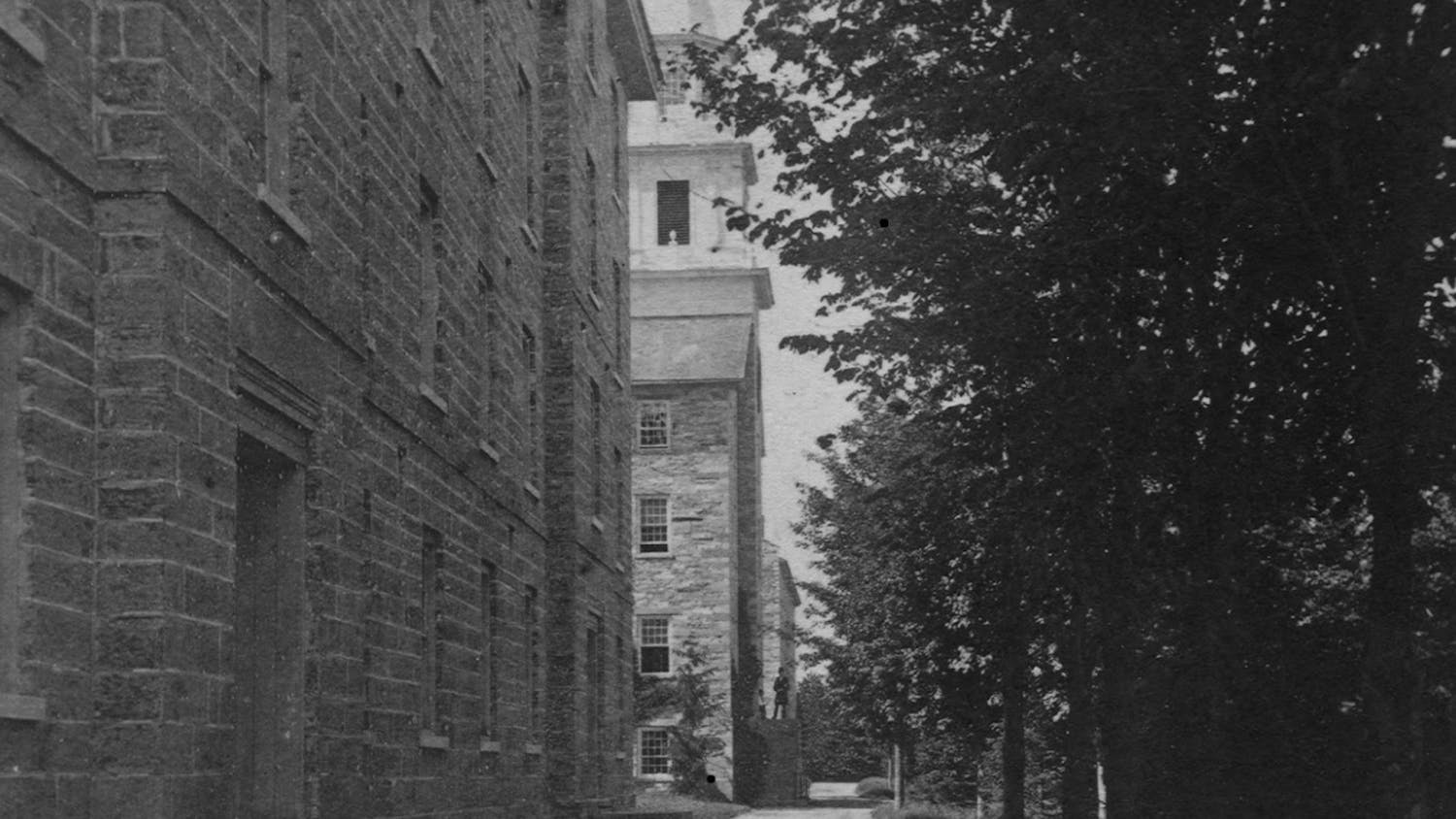In July 1845, American transcendentalist poet, essayist and philosopher Ralph Waldo Emerson walked the same Old Chapel halls that Middlebury students and administration do today.
Emerson’s commencement address to the class of 1845 is a true treasure of the Middlebury College Special Collections. “Emerson at Middlebury College” was published in 1999 by Friends of the Library, a literary society founded in 1987. The book contains a preface written by Robert Buckeye, librarian and curator of the Abernathy Collection at Middlebury from 1973 to 2003, essays written by Sylvia Robison and John McWilliams, and Emerson’s own words.
Through her essays, Sylvia Robison, member of the Middlebury Town Democratic Committee and Middlebury Congressional Church since 1975, revealed background information that contextualized 19th century Middlebury College.
In 1845, students of Middlebury College were largely conservative and religiously devout. These characteristics were a manifestation of religious controversy from the Second Great Awakening and the national financial crisis of 1837. Supported by Vermont’s Congregational clergy, many Middlebury presidents, faculty and trustees were Congregational ministers.
Between faculty turnover, financial problems and enrollment decline, the college was in crisis. What’s more, competition for state resources and differing religious perspectives between the University of Vermont and Middlebury College engendered a rivalry between the two institutions.
“The Institution struggled against neglect and poverty… carefully balancing between hope and fear,” said Benjamin Labaree, then-president.
According to Robison, “dissatisfaction with the classical academic curriculum led to the formation of student literary societies.” One of these societies was the Philomathesian Society, which Middlebury Special Collections has records of from 1803 to 1855. The Society met every week to debate “political, religious, social and educational issues.” In 1844, Middlebury senior Silas Randall wrote to Emerson on behalf of the Society inviting him to speak.
In McWilliam’s analysis of Emerson’s speech, he comments on Emerson’s opening “Likening Middlebury to Attic Greece,” where “the life of the mind, as symbolized in the Athenian wheat vine and olive, [is] everywhere and of all time.” The mind, in Emerson’s eyes, is infinite in its ability to imagine, to observe and to expand.
Middlebury students today can still learn from Emerson’s speech, which gives advice to the scholar through three primary assertions.
The first is that separation where there should be unity limits the infinite potential of the scholar’s mind. Emerson said, “I find a provision in the Constitution of the world for the class of Scholars, for the Theorist, the uniter, for him who is to show identity and connexion where men see nothing but fragments, & to supply the axis on which the frame of things turns.” In McWilliam’s words, “Emerson assumed that many of his contemporaries see their world as a multiverse of separable fragments that justify and necessitate increasing specialization within all professions.” His challenge to the Middlebury scholar, then, is to find unity (in the way that liberal arts praises interdisciplinary study) where there seems to be separation between subjects. The “axis” turning is the scholar’s ability to be flexible and entertain many passions at once. Further, McWilliams writes that “Empiricism and Idealism, imagination and measurement, Emerson well knew, would have to work together in the Scholar’s search for truth.”
Emerson’s second piece of advice for the Middlebury scholar is to search for universal truth, but to know it is never completely attainable; the point of education lies not in the acquisition of that truth, but rather in the constant flux of learning. In McWilliams’ words, “Emerson always insisted…that no mind had arrived at any final Truth, and the student taught to think so was being crippled.” As Emerson said, “In our experience, learning is not learned, nor is genius wise.” The scholar, in his eyes, is “unfurnished who has only literary weapons. He ought to have as many talents as he can.”
Finally, the transcendentalist calls the scholar to reflect on their life through a series of six questions: “Who are you? What do you do? Can you obtain what you wish? Is there method in your consciousness? Can you see tendency in your life? Can you help any soul?” Though Emerson himself was pious, we are not asked these questions by some deity or pedagogy, but by the society in which we live.
Addison County’s weekly newspapers offered feedback on Emerson’s speech. The Northern Galaxy commented that, “the manner and style of Mr. Emerson is highly cultivated and polished. His address was of highly transcendental character.” As the Vermont Observer noted, “[The speech] was highly literary and exhibited a mind of no common order.” The Middlebury Reporter, predecessor of The Campus, mused that “such an ordinary looking man could be transformed when he began to speak, and just as Emerson was transformed by his words, so was his audience.”
Middlebury students felt as if they were intruding on a private conversation between Emerson and himself. “His audience was not listening to something directly addressed to their minds; instead, they overheard someone who appeared to be conducting a conversation with himself,” a scholar reflected. Robison writes, “Nearly all agreed that there was magic in the delivery.”
Ralph Waldo Emerson declined the request of the Philomathesian Society to publish his 1845 “Commencement Address” at Middlebury College. As stated by Buckeye, “The Friends’ publication of the Emerson address 155 years after it was delivered is a significant Bicentennial bookmark.”
As Middlebury students, the lessons we glean from Emerson’s speech may help us continue to grow as scholars, members of the community and self-reflective individuals.



